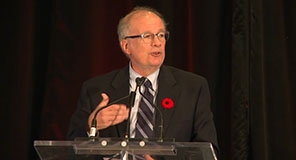
Retired actuary and retirement guru Malcolm Hamilton this week released a C.D. Howe paper entitled Do Canadians Save Too Little? The Hub’s initial take ran Thursday here: It’s an exaggeration to say we are saving too little for retirement.
Hamilton also wrote a summary of the paper in the FP Comment section of the Financial Post on Thursday, bearing the title False pension assumptions on Canadian savings.
We at the Hub have always said frugality is the key to saving and ultimately building wealth. But according to the most-emailed New York Times article this week, it’s tough for millionaires to dump the frugal habits that got them there: Millionaires who are frugal when they don’t have to be. Shades of the book, The Millionaire Next Door!
More (much more!) on Voluntary CPP
On Thursday, the National Post’s lead editorial was about the voluntary expanded Canada Pension Plan: National Post’s View: A Bigger CPP isn’t about Fairness. It says “CPP is about income replacement, not income support: It’s a contributory program, not a redistributive one.” It closes with the valid observation that one reason we’re not saving enough is that because “taxes take such a massive bite from Canadians’ take-home pay. If so, could Canadians not be induced to save more by taxing them less?”
Well, of course, which is exactly how pensions and the RRSP system are supposed to work.
The Hub isn’t keen about new compulsory forced savings programs, whether from Ontario or expanding the CPP. But a voluntary expansion seems a much more reasonable proposition. After all, RRSPs and TFSAs are also voluntary. On Wednesday, we ran a guest blog by Jean-Pierre Laporte on this topic, entitled Voluntary CPP is an old idea … has its time finally come?
Canadian Business ran a piece outlining 7 problems Voluntary CPP contributions could solve. The big one is number 7, longevity risk and the fact CPP (whether voluntary or in its existing form) behaves much like an annuity. Here at the Hub, as well as at MoneySense, we also reprised recent work by author and finance professor Moshe Milevsky, in What’s the difference between life annuities and tontines?
But wait, on Friday at the Financial Post tax expert Jack Mintz argued that CPP expansion hurts poor and middle-income Canadians. In the print edition, the same piece bears the headline CPP’s dirty tax secret. Which is? Mintz points out that — like RRSPs and the new PRPPs — income from CPP is fully taxable and therefore will trigger clawbacks of government retirement benefits like Old Age Security or, for seniors with little other income, the Guaranteed Income Supplement. (What little savings can be generated while working might better be diverted to a Tax Free Savings Account, he seems to be implying, since TFSAs are neither taxed nor generate clawbacks on withdrawal).
Finally, over at the Globe & Mail, Rob Carrick reprises Seven things to know for the Canada Pension Plan debate. On Friday, Rob also wrote that It’s time to get real about retirement planning.
Can a USA save Social Security?
While on the subject of pension reform, how about fixing Social Security in the United States? I’ve been reading several books about longevity recently and every one of them questions the long-term viability of Social Security and Medicare. For your reading pleasure, consider the Universal Saving Account (USA!) proposed early in April by Forbes blogger John Wasik: Social Security, Retirement are Saved and Expanded. (Warning: When I say early in April, I mean really early: April 1st!)
Motley Fool’s Housel on 5 bedrock investing principles
My latest column for Motley Fool Canada is now online. As the Hub did shortly after the last federal budget, it looks at the lower RRIF withdrawal limits for seniors, the second of the three big Budget wins I called the Findependence Trifecta. In the meantime, in the U.S. Motley Fool columnist Morgan Housel has another excellent column in the Wall Street Journal, titled Five Bedrock Principles for Investors.


The Rob Carrick article “It’s time to get real about retirement planning” got me thinking. He stated that people shouldn’t count on working past retirement age because many people will not be able to due to health issues. I wonder what were the health issues and what caused them? Were some of them preventable? Did working in a job that you didn’t like or for a bad boss have anything to do with it?.Prolonged stress/anxiety causes all sorts of bad things to happen. Adopting bad habits (drinking to much, eating too much etc) to help decompress from your job is not the way to go if you want to protect your health.